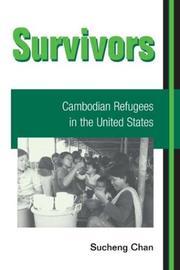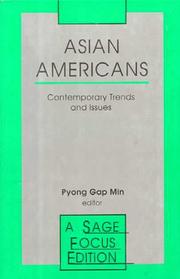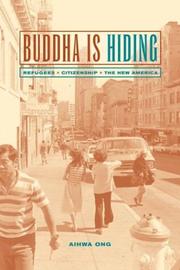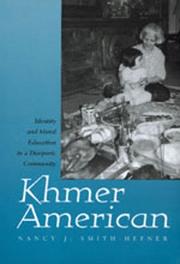| Listing 1 - 10 of 19 | << page >> |
Sort by
|
Book
Year: 1975 Publisher: Washington : U.S. G.P.O.,
Abstract | Keywords | Export | Availability | Bookmark
 Loading...
Loading...Choose an application
- Reference Manager
- EndNote
- RefWorks (Direct export to RefWorks)
Political refugees --- Vietnamese Americans. --- Cambodian Americans. --- Legal status, laws, etc.
Book
ISBN: 9781438466651 143846665X 9781438466637 Year: 2017 Publisher: Albany
Abstract | Keywords | Export | Availability | Bookmark
 Loading...
Loading...Choose an application
- Reference Manager
- EndNote
- RefWorks (Direct export to RefWorks)
Cambodian Buddhism in the United States is the first comprehensive anthropological study of Khmer Buddhism as practiced by Khmer refugees in the United States. Based on research conducted at Khmer temples and sites throughout the country over a period of three and a half decades, Carol A. Mortland uses participant observation, open-ended interviews, life histories, and dialogues with Khmer monks and laypeople to explore the everyday practice of Khmer religion, including spirit beliefs and healing rituals. This ethnography is enriched and supplemented by the use of historical accounts, reports, memoirs, unpublished life histories, and family memorabilia painstakingly preserved by refugees. Mortland also traces the changes that Cambodians have made to religion as they struggle with the challenges of living in a new country, learning English, and supporting themselves. The beliefs and practices of Khmer Muslims and Khmer Christians in the United States are also reviewed.
Buddhism --- Buddhists --- Cambodian Americans --- Religion. --- Cambodia. --- United States.
Periodical
ISSN: 21538999
Abstract | Keywords | Export | Availability | Bookmark
 Loading...
Loading...Choose an application
- Reference Manager
- EndNote
- RefWorks (Direct export to RefWorks)
Southeast Asian Americans --- Education --- Social conditions --- cambodian americans --- laotian americans --- hmong americans --- vietnamese americans
Book
Year: 2003 Publisher: Bethesda, MD : U.S. Department of Health and Human Services, National Institutes of Health, National Heart, Lung, and Blood Institute,
Abstract | Keywords | Export | Availability | Bookmark
 Loading...
Loading...Choose an application
- Reference Manager
- EndNote
- RefWorks (Direct export to RefWorks)
Cambodian Americans --- Cardiovascular system --- Coronary heart disease. --- Health and hygiene --- Diseases --- Risk factors --- Prevention.

ISBN: 0252050991 9780252050992 0252029208 0252071794 9780252029202 9780252071799 Year: 2004 Publisher: Urbana
Abstract | Keywords | Export | Availability | Bookmark
 Loading...
Loading...Choose an application
- Reference Manager
- EndNote
- RefWorks (Direct export to RefWorks)
Cambodian Americans --- Refugees --- Cambodians --- Ethnology --- Displaced persons --- Persons --- Aliens --- Deportees --- Exiles --- Social conditions. --- Cambodia --- History --- Social conditions --- United States --- Biography --- 20th century

ISBN: 0803943369 Year: 1995 Volume: 174 Publisher: Thousand Oaks (Calif.): Sage
Abstract | Keywords | Export | Availability | Bookmark
 Loading...
Loading...Choose an application
- Reference Manager
- EndNote
- RefWorks (Direct export to RefWorks)
Amerikanen van Vietnamese origine --- Américains asiatiques --- Américains d'origine japonaise --- Américains d'origine vietnamienne --- Asian Americans --- Aziatische Amerikanen --- Cambodian Americans --- Chinese Americans --- East Indian Americans --- Filipino Americans --- Japanese Americans --- Japanse Amerikanen --- Korean Americans --- Laotian Americans --- Vietnamese Americans --- #KVHA:Volkeren; Verenigde Staten --- #KVHA:American Studies --- Chinese Amerikanen --- Sino-Américains --- Asians --- Ethnology
Book
ISBN: 1785334719 1785334700 Year: 2017 Publisher: New York ; Oxford, [England] : Berghahn Books,
Abstract | Keywords | Export | Availability | Bookmark
 Loading...
Loading...Choose an application
- Reference Manager
- EndNote
- RefWorks (Direct export to RefWorks)
"Grace after Genocide is the first comprehensive ethnography of Cambodian refugees, charting their struggle to transition from life in agrarian Cambodia to survival in post-industrial America, while maintaining their identities as Cambodians. The ethnography contrasts the lives of refugees who arrived in America after 1975, with their focus on Khmer traditions, values, and relations, with those of their children who, as descendants of the Khmer Rouge catastrophe, have struggled to become Americans in a society that defines them as different. The ethnography explores America's mid-twentieth century involvement in Southeast Asia and its enormous consequences on multiple generations of Khmer refugees"--
Khmer (Southeast Asian people) --- Refugees --- Cambodian Americans --- Social conditions. --- Cultural assimilation. --- Cambodians --- Ethnology --- Displaced persons --- Persons --- Khmer Krom (Southeast Asian people) --- Khmers --- 1970s. --- america 1975. --- biographical. --- biography. --- cambodia. --- cambodian refugees. --- catastrophe. --- cultural traditions. --- culture clash. --- ethnographic analysis. --- ethnography. --- example. --- genocide. --- international history. --- khmer rouge. --- khmer. --- refugee. --- shock. --- society. --- southeast asia. --- war. --- world history.

ISBN: 159734513X 9786612762925 0520937163 1282762923 9780520937161 1417522798 9781417522798 0520229983 9780520229983 0520238249 9780520238244 9781597345132 6612762926 9781282762923 Year: 2003 Publisher: Berkeley ; London : University of California Press,
Abstract | Keywords | Export | Availability | Bookmark
 Loading...
Loading...Choose an application
- Reference Manager
- EndNote
- RefWorks (Direct export to RefWorks)
Fleeing the murderous Pol Pot regime, Cambodian refugees arrive in America as at once the victims and the heroes of America's misadventures in Southeast Asia; and their encounters with American citizenship are contradictory as well. Service providers, bureaucrats, and employers exhort them to be self-reliant, individualistic, and free, even as the system and the culture constrain them within terms of ethnicity, race, and class. Buddha Is Hiding tells the story of Cambodian Americans experiencing American citizenship from the bottom-up. Based on extensive fieldwork in Oakland and San Francisco, the study puts a human face on how American institutions-of health, welfare, law, police, church, and industry-affect minority citizens as they negotiate American culture and re-interpret the American dream. In her earlier book, Flexible Citizenship, anthropologist Aihwa Ong wrote of elite Asians shuttling across the Pacific. This parallel study tells the very different story of "the other Asians" whose route takes them from refugee camps to California's inner-city and high-tech enclaves. In Buddha Is Hiding we see these refugees becoming new citizen-subjects through a dual process of being-made and self-making, balancing religious salvation and entrepreneurial values as they endure and undermine, absorb and deflect conflicting lessons about welfare, work, medicine, gender, parenting, and mass culture. Trying to hold on to the values of family and home culture, Cambodian Americans nonetheless often feel that "Buddha is hiding." Tracing the entangled paths of poor and rich Asians in the American nation, Ong raises new questions about the form and meaning of citizenship in an era of globalization.
Cambodian Americans --- Refugees --- Citizenship --- Birthright citizenship --- Citizenship (International law) --- National citizenship --- Nationality (Citizenship) --- Political science --- Public law --- Allegiance --- Civics --- Domicile --- Political rights --- Displaced persons --- Persons --- Aliens --- Deportees --- Exiles --- Cambodians --- Ethnology --- Social conditions. --- Ethnic identity. --- Civil rights --- Social aspects --- Law and legislation --- Oakland (Calif.) --- City of Oakland (Calif.) --- Ethnic relations. --- Américains d'origine cambodgienne --- Réfugiés --- Social conditions --- Ethnic identity --- Conditions sociales --- Identité ethnique --- Family. --- Cambodians. --- Adaptation. --- Refugees. --- Américains d'origine cambodgienne --- Réfugiés --- Citoyenneté --- Droits --- Conditions sociales. --- Identité collective. --- american citizenship. --- american culture. --- american dream. --- american institutions. --- anthropology. --- asia scholars. --- buddhism. --- buddhists. --- california. --- cambodian americans. --- cambodian refugees. --- citizenship experience. --- cultural anthropologists. --- demographic studies. --- ethnic tensions. --- fieldwork. --- globalization. --- minority citizens. --- modern history. --- new america. --- nonfiction study. --- oakland. --- pol pot regime. --- race and class. --- regional history. --- san francisco. --- social sciences. --- southeast asia. --- textbooks. --- welfare. --- Citoyenneté --- Identité collective.
Book
ISBN: 1885288867 9781885288868 Year: 1998 Publisher: Fayetteville : PREP Publishing,
Abstract | Keywords | Export | Availability | Bookmark
 Loading...
Loading...Choose an application
- Reference Manager
- EndNote
- RefWorks (Direct export to RefWorks)
by Gordon Beld Pol Pot was the Khmer Rouge leader whose reign of terror caused the death of up to 2 million Cambodians in the mid-1970s. He masterminded an extreme, Maoist-inspired revolution in which Cambodians died in mass executions, and from starvation and disease. This book of historical fiction shows the life of one refugee from the reign of genocide. ""I am pleased to recommend A Gentle Breeze From Gossamer Wings. Every Christian in America should read it. It's a story you won't want to miss - and it could change your life."" - Robert H. Schuller, Pastor, Crystal Cathedral ISBN 1-885288
Cambodia--History--1975-1979--Fiction. --- Cambodian Americans--Fiction. --- Political atrocities --- Cambodian Americans --- Political refugees --- American Literature --- English --- Languages & Literatures --- Cambodians --- Ethnology --- Atrocities --- Fiction --- Cambodia --- History --- Fiction. --- Cambodge --- Khmer Republic --- Cam Bot --- Cambotja --- République khmère --- Kambodscha --- Kamboja --- Kambodža --- Tchin-la --- Chien-pʻu-chai --- Democratic Kampuchea --- Kambujā --- Democratic Cambodia --- Camboja --- Preah Reach Ana Chak Kampuchea --- Kâmpŭchéa Prâchéathĭpâteyy --- Kampuchea démocratique --- République du Cambodge --- Campuchia --- Kampuchea (Coalition Government, 1983- ) --- Kampuchea --- Kampuchii︠a︡ --- Kamphūchā --- Kingdom of Cambodia --- Preăhréachéanachâkr Kâmpŭchéa --- Cambogia --- Roat Kampuchea --- State of Cambodia --- Cambodja --- Royal Government of Cambodia --- Braḥrājāṇacakr Kambujā --- Rājraṭṭhabhipāl Kambujā --- French Indochina

ISBN: 0585283540 0520920864 9780520920866 9780585283548 0520213483 0520213491 9780520213487 9780520213494 Year: 1999 Publisher: Berkeley University of California Press
Abstract | Keywords | Export | Availability | Bookmark
 Loading...
Loading...Choose an application
- Reference Manager
- EndNote
- RefWorks (Direct export to RefWorks)
In the early 1980s, tens of thousands of Cambodian refugees fled their war-torn country to take up residence in the United States, where they quickly became one of the most troubled and least studied immigrant groups. This book is the story of that passage, and of the efforts of Khmer Americans to recreate the fabric of culture and identity in the aftermath of the Khmer holocaust.Based on long-term research among Cambodians residing in metropolitan Boston, this rich ethnography provides a vivid portrait of the challenges facing Khmer American culture as seen from the perspective of elders attempting to preserve Khmer Buddhism in a deeply unfamiliar world. The study highlights the tensions and ambivalences of Khmer socialization, with particular emphasis on Khmer conceptions of personhood, morality, and sexuality. Nancy J. Smith-Hefner considers how this cultural heritage influences the performance of Khmer children in American schools and, ultimately, determines Khmer engagement with American culture.
Cambodian Americans --- United States Local History --- Regions & Countries - Americas --- History & Archaeology --- Cambodians --- Ethnology --- Ethnic identity --- Religion --- Boston (Mass.) --- Ethnic relations. --- City of Boston (Mass.) --- Beantown (Mass.) --- بوسطن (Mass.) --- Būsṭun (Mass.) --- Бостон (Mass.) --- Горад Бостан (Mass.) --- Horad Bostan (Mass.) --- Бостан (Mass.) --- Bostan (Mass.) --- Бостън (Mass.) --- Bostŭn (Mass.) --- Βοστώνη (Mass.) --- Vostōnē (Mass.) --- Bostono (Mass.) --- بوستون (Mass.) --- Pô-sṳ-tun (Mass.) --- 보스턴 (Mass.) --- Bosŭt'ŏn (Mass.) --- Posŭt'ŏn (Mass.) --- Pokekona (Mass.) --- בוסטון (Mass.) --- Bostonia (Mass.) --- Bostona (Mass.) --- Bostonas (Mass.) --- ボストン (Mass.) --- באסטאן (Mass.) --- Bostons (Mass.) --- 波士顿 (Mass.) --- Boshidun (Mass.)
| Listing 1 - 10 of 19 | << page >> |
Sort by
|

 Search
Search Feedback
Feedback About UniCat
About UniCat  Help
Help News
News